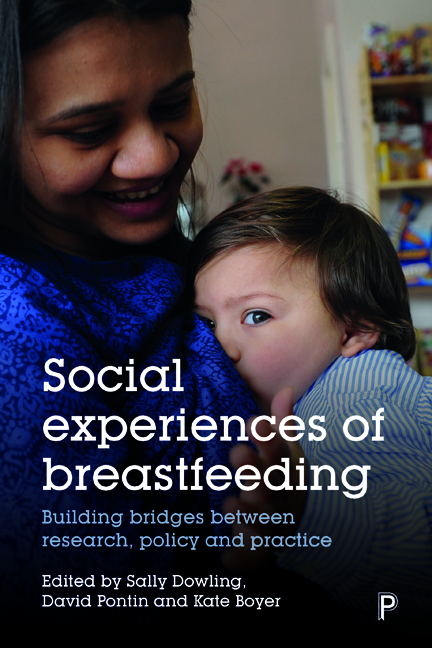Book contents
- Frontmatter
- Dedication
- Contents
- List of tables and figures
- Notes on contributors
- Acknowledgements
- Introduction
- The UK policy context: reconfiguration of the Unicef UK Baby Friendly Initiative to reflect the importance of relationships and ensuring sustainability
- Part I Breastfeeding and emotions
- Part II Cultures of breastfeeding
- Part III Breastfeeding and popular culture
- Conclusion
- Appendix: Schedule for ESRC Seminar Series: Social Experiences of Breastfeeding: Building bridges between research and policy, 2015–16
- Index
twelve - Embodiment as a gauge of individual, public and planetary health
Published online by Cambridge University Press: 22 April 2022
- Frontmatter
- Dedication
- Contents
- List of tables and figures
- Notes on contributors
- Acknowledgements
- Introduction
- The UK policy context: reconfiguration of the Unicef UK Baby Friendly Initiative to reflect the importance of relationships and ensuring sustainability
- Part I Breastfeeding and emotions
- Part II Cultures of breastfeeding
- Part III Breastfeeding and popular culture
- Conclusion
- Appendix: Schedule for ESRC Seminar Series: Social Experiences of Breastfeeding: Building bridges between research and policy, 2015–16
- Index
Summary
Introduction
In 2016 the Lancet published a series of papers showcasing the importance of situating breastfeeding within its social and cultural contexts (Rollins et al, 2016; Victora et al, 2016). I begin this chapter by considering the specific context of the workplace, as it presents significant barriers to women seeking to continue breastfeeding as they return to work (Boswell-Penc and Boyer, 2007). I move from there to consider lactating working mothers alongside lactating (working) cows, the source of most infant formula that non-nursing mothers use. Considering both lactating mothers and lactating cows, I find that increasing degrees of embodiment correspond with increasing degrees of individual, public and planetary health.
I assume here the broadest social and cultural view, as we reside at a precipice in terms of public health (Fuhrman, 2003; Weber, 2009) as well as climate change and global depletion (IPCC, 2014). Breast milk for young ones and non-dairy milk for others emerges as critical to securing optimal health for all; additionally, as research has surfaced pointing to ways in which we make healthier decisions when we focus on others, compassion becomes an entry into moving into practices that support global health (Poulin, 2013). As research into ‘kangaroo care’ – skin-to-skin engagement with infants – suggests, full embodiment increases compassion, just as breastfeeding increases oxytocin (Ludington-Hoe and Swinth, 1996). Compassion in its broadest sense may become part of the toolbox that can help breastfeeding professionals make a case for exclusive and extended breastfeeding.
Barriers, embodiment and disembodiment
A few years ago, Kate Boyer and I conducted research into barriers that prevent mothers from continuing to breastfeed after their return to work (Boswell-Penc and Boyer, 2007). In addition to the legal and logistical barriers, a surprising barrier that we encountered was women's perceptions of themselves using breast pumps. Many said that the thought of using the devices made them ‘feel like a cow’ (Boswell-Penc and Boyer, 2007). They were anxious that the activity might leave them feeling disembodied, not like themselves, but rather like a cow in the dairy industry. Cows’ lives in these contexts, after all, are hyper-focused around milk production, often with grave consequences (Webster, 1986; Foer, 2009). Whatever the source of anxiety, these women opted for formula use upon returning to work after maternity leave (Boswell-Penc and Boyer, 2007).
- Type
- Chapter
- Information
- Social Experiences of BreastfeedingBuilding Bridges between Research, Policy and Practice, pp. 219 - 236Publisher: Bristol University PressPrint publication year: 2018



